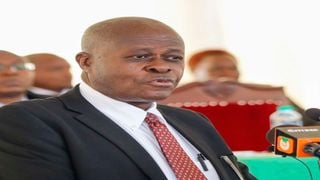
Knec chairperson, Prof Julius Nyabundi, speaks at Knec headquarters in Nairobi during the release of the 2023 KCPE results on November 23, 2023.
| Wilfred Nyangaresi | Nation Media GroupOur Columnists
Premium
End of KCPE and KCSE rids us of the obsessive reporting of exams
Three cheers for the end of the KCPE and KCSE exams (the latter in just four years) and ushering in of competency-based curriculum and competency-based assessment.
It means the end of the obsessive media coverage of the exams results that has beset this country since 1985, when the first KCPE class was examined. It means the end of the silly season, when other happenings are pushed aside to make room for the coverage of the exams and even related trivia.
Nevertheless, top-performing schools and students love the media publicity. Thousands of fond parents and family member enjoy the excitement of having their children lionised with pictures and words in national newspapers. Schools and teachers receive free publicity for their work. Newspapers sell more copies.
The negative impacts of the publicity have, however, been largely ignored. They have included driving up stress, anxiety and pressure to score high marks. In some cases, this has led to exam cheating, sometimes aided by teachers and parents.
Probably no other country comes close to such all-consuming and obsessive media coverage of exam results. Everything to do with exams and performance is covered, including how-to-study tips and candidates’ plans for the future.
Most important news
The exam results have been the most important news of the day. Looking back, the Nation Education senior writer David Muchunguh says the exams were a matter of life and death as they determined placement to different categories of secondary schools.
He writes: “So serious has been the affair that it became customary for parents and teachers to congregate days before the exams to seek divine intervention” (“End of an era as learners sit final 8-4-4 KCPE exam.” (Nation. Africa, October 30, 2023).
Now that the KCPE and KCSE exams are no more, the media will, no doubt, let the hippopotamus of obsessive reporting get back to the river. Many readers will be happy.
One of them is Njoroge Waweru, who is highly critical of the Nation’s “cherished tradition of excessive coverage of KCPE and KCSE results.” He says when the results are announced, “everything else is dropped, however important, and the entire media landscape will only be attuned to exam results”.
He gives the example of last Friday’s Daily Nation, in which 16 pages are dedicated to KCPE exam results. More than 80 portraits of top performers are published in the issue.
“Just how much important is KCPE compared to other weighty news, like university graduation ceremonies?” wonders Waweru. “We are just entering the graduation season and I have been following the Nation’s coverage of university graduation since 1990, when we had four universities only. The Nation, just like other media houses, will only cover graduation events depending on who the chief guest is.”
Mr Waweru questions the rationale of devoting too much detail to those who sit KCPE and KCSE and scored the highest and the ranking of schools according to performance. “Why don’t we accord this glitz to higher education?” he asks.
He says higher education is much more important to Kenya’s development than KCPE and KCSE combined. “Why doesn’t the Nation report how many students have been awarded First Class Honours in medicine, law, IT and economics? How many PhDs graduate in every university?”
He says many universities have never had media coverage of their graduation ceremonies. “Nation only reports about cash crunch in public universities, appointment of university councils, strikes, Helb and other mundane things. Why doesn’t the Nation write about research in the various universities, which professors attract research grants, corruption issues bedeviling public universities and how many tenured professors there are in the universities?”
Mr Waweru pleads with the Nation to grant at least half of the coverage usually given to KCPE and KCSE to university graduations countrywide. “I would like to see news of a university graduation make headlines the way KCPE and KCSE does—for instance, when in a single university no master’s and PhD student has graduated or all students have been awarded First Class Honours.”
He would like to see the Nation interview students, parents, civil society, academic staff, distinguished professors, foreign academics in world-class universities and corporate executives about university issues “as opposed to interviewing only the vice -chancellor, council, Universities Academic Staff Union, and Education CS.”
Perhaps I should mention that Mr Waweru describes himself as an academic activist.
- The Public Editor is an independent news ombudsman who handles readers’ complaints on editorial matters including accuracy and journalistic standards. Email: [email protected]. Call or text 0721989264.





